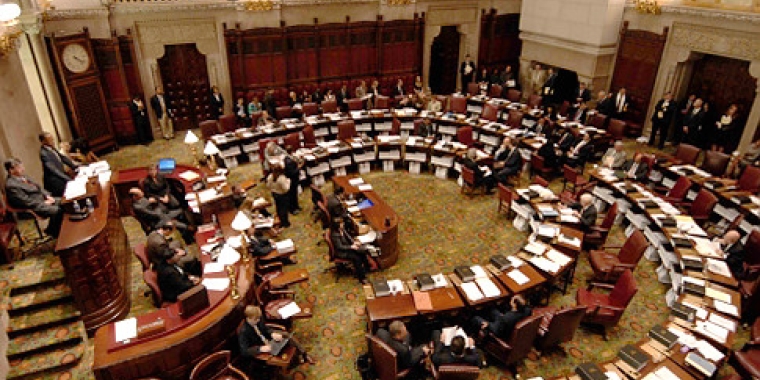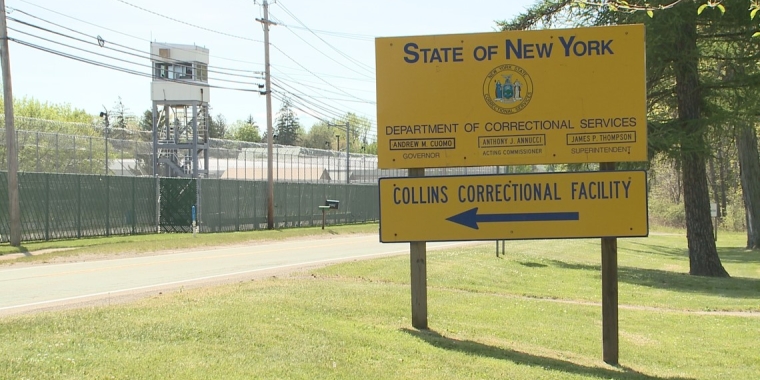
Senator Gallivan Unveils "Growing Strong" Plan to Promote Agriculture
Jim Ranney
March 12, 2018
-
ISSUE:
- Agriculture

Senator Patrick M. Gallivan and the Senate’s Majority Conference have released a comprehensive package of initiatives to support New York’s family farmers and will once again lead the budget conversation about the importance of agriculture to our economy, good health, and future growth. The “Growing Strong” plan will help strengthen family farms and create new jobs in the agriculture industry by expanding markets, reducing production costs, and investing in the state’s leading industry.
“This comprehensive plan supports agriculture as New York’s number one industry,” Gallivan said. “By investing in agriculture, cutting burdensome regulations and reducing the costs that our hard working farmers face, we encourage growth in the industry and the next generation of family farms.”
This year, the Senate Majority Conference will champion full restoration of the nearly $13 million in cuts proposed in the Executive Budget. As a major employer and vital engine of rural economies, agriculture deserves a guaranteed seat at the state’s economic development table, and the Senate will push to ensure that agriculture gets its share of economic development funding in the new State Budget.
Since 2011, the Senate Majority has led efforts to provide more than $50 million in restored executive budget cuts, increased funding, as well as spearheaded initiatives that are helping farmers achieve new heights in production and efficiency.
In addition to the restoration of the Governor’s budget cuts, the “Growing Strong” plan includes initiatives that will strengthen and preserve agriculture as a chief economic driver in the state. The initiatives include:
· Examine burdensome regulations: Direct state regulators to study existing state regulations that are harmful to farming, unnecessarily increase costs, and prevent farm success;
· Create a one-stop hotline for farmers seeking information on available state funding and resources to grow their businesses;
· Repeal the Highway Use Tax for farm-registered trucks, and exempt farmers from any proposal to add new “tolling” to enter New York City, as a way to bring more New York-grown products into the nation’s largest consumer market. New York is one of just four states that still imposes a such a tax;
· Help farmers invest in facilities and buy equipment: S7851 provides a tax credit for dairy farmers to encourage investment in facilities and equipment that will allow them to take advantage of a growing demand for “value-added” dairy products, like flavored drinks, yogurts, and other products that can satisfy existing, wide demand, such as in growing ethnic minority communities within the state;
· Modernize regulations for home processors: S7840, allows home processors to use direct and indirect internet sales; home-based in-person sales; home-based delivery services; and community-supported agriculture subscriptions. Amending the law will reduce artificial barriers to business growth, expand potential markets, and help these entrepreneurs compete and grow their businesses. The bill also calls on the Department of Agriculture and Markets to review onerous regulations that limit the types of products home processors can make and sell. Reforming Albany's regulations can help unleash the creativity and entrepreneurial spirit of New Yorkers to potentially create thousands of new small businesses;
· Make it easier to cross-promote products: S5853 expands the privileges of farm breweries, cideries, wineries and distilleries to cross-promote each other’s products and to share a more similar set of privileges under the law. The bill will help the state’s regional and craft alcoholic beverage producers to cross-promote and collaborate in new ways that were previously only available to out-of-state competitors;
· Help farmers by giving them access to IDAs : S2388 authorizes industrial development agencies (IDAs) to provide technical and financial assistance to agricultural producers that grow, harvest, or produce agricultural products in this state. Expanding the authorization of already existing IDAs – which, under current law can only issue loans and provide technical support to manufacturers, processers, and warehousers of agricultural products – helps these agencies promote job growth in industries that rural areas of the state already have specialized in, such as fruit cultivation, raising of beef and other animals, and other agricultural pursuits. (passed the Senate on 2/27/18);
· Ease restrictions on utility vehicles: S7850 allows registration of all-terrain vehicles with a weight of no more than 1,500 pounds, operated upon public highways connecting portions of a farm or farms, fields, and agriculture buildings, and up to one-half mile from the vehicle owner's farm. Under current law, the increasingly popular utility vehicles cannot be registered for operation on highways in the state. Because of their relatively smaller size, these vehicles have proved useful and cost-effective in helping farmers perform daily tasks, including moving animals, feed, and equipment between fields and in making it possible to access areas of their farms where more traditional tractors and heavy equipment cannot go;
· Provide a tax credit for the purchase of New York-grown crops: S7217 creates a tax credit for companies that purchase New York-grown crops and use such crops in their value-added products; such credit increases with increased net sales. This bill is mutually beneficial for the state’s farmers and craft beer producers that will be incentivized to buy in-state crops. Craft beer producers will keep industry dollars in the state economy while encouraging further growth of these high-demand crops. Eligible crops include various fruits, vegetables, and field crops including, among others, wheat, barley, and hops;
· Boost maple sap production: S7842 creates a system for permitting access to certain state lands for the purpose of collecting sap from maple trees and a tax credit for the purchase of qualified equipment used for the production of maple syrup. Allowing New Yorkers to tap some trees on state owned land will utilize an important untapped resource while creating new jobs and generating new state revenues. The tax credit for equipment will make it easier for farmers and others to enter the business or modernize their operations to more fully take advantage of this unique resource;
· Create a solar array pollinator benefit program: S6339A creates a voluntary standard for solar site owners who wish to publically claim that their site is beneficial to pollinators, including minimum standards for biodiversity and land management practices. In 2016, it was estimated that New York State had lost fifty percent of its managed pollinator colonies and 70 percent of its commercial migratory bees. Wild pollinators have also seen their numbers suffer, with the Department of Environmental Conservation listing seven species of bees and 27 species of butterfly or moths as being Species of Greatest Conservation Need;
· Create a “Lifeline Dairy Energy Assistance Program” for dairy farmers struggling with a prolonged slump in milk prices, directing $10 million in existing NYSERDA funds to install high efficiency lighting, pumping and cooling equipment, and to promote investment in energy-producing biomass generators and digesters. In addition to lowering farmers’ costs and improving efficiency, these investments will help the state towards its goal of increased reliance on renewable energy;
· Provide a new tax credit for craft brewers to encourage them to share their spent grains with dairy farmers to be used as cost-effective and nutritious feed;
· Expand agricultural P-Tech education programs that help prepare students for increasing technology demands of farming careers, restore funding for Beginning Farmer Grants that was cut from the Executive Budget, and increase support to establish new chapters of school-based FFA programs in response to growing interest in agriculture;
· Expand opportunities for success in agriculture by creating a specialized education certificate to acknowledge student achievement and training in the field;
· Increasing access to viable agricultural land: S7841 directs the Department of Agriculture and Markets to develop an online list of state and privately owned lands that could be sold or leased to beginning farmers through a New York Farmland Licensing Program and directs the Agriculture Advisory Council to provide state agencies with advice on how to better address the needs of new farmers. Farming is a difficult business- several factors, such as the complex process of transferring ownership of farms and prohibitive capital costs, contribute to the aging of the farm population and present barriers to younger farmers gaining access to land;
· Encouraging more women to pursue farming careers: S7843 authorizes the Department of Agriculture and Markets to conduct a study to identify obstacles and impediments that prevent more women from pursuing agricultural careers. Attracting new farmers to pursue farming careers in New York is critical, and continuing to focus the state’s efforts on encouraging growing sectors of the agricultural economy, like women-owned farm businesses, is a very important step in that direction. Since 2002, the number of women farmers in New York grew 14 percent, while the number of male-owned farms dropped by 8 percent.
· Protecting farmland near military bases: S7817 establishes an open space preservation project initiative to purchase air rights from farmers in areas where wind turbines could interfere with critical military training and operations, such as Fort Drum. By creating a targeted preservation program, the state can extend its limited resources to provide significant financial incentives to preserve farmland and open space and ensure continued agriculture production, while also averting development that threatens safe and effective military training and operations;
· Support efforts to recognize “New York” products, including creation of unique labels for products in every county of the state, complementing the Governor’s proposal to highlight regional favorites;
· Upgrade and modernize State agency websites to allow consumers to more easily search for local farmers markets;
· Expand the Senior Farmers’ Market Nutrition Program to make disabled veterans eligible for fresh produce benefits;
· Ensuring farmers’ markets are equipped to accept EBT benefit cards: S3034 provides state funding for the fees and costs associated with providing electronic benefit transfer technology at farmers markets. This initiative expands access to healthy foods by allowing access to necessary financial support to the several hundred unauthorized farmers markets across the state, thereby encouraging healthy eating, supporting local economies, and enabling all residents to purchase foods at farmers' markets.
These initiatives will be incorporated into budget negotiations and legislative actions the Senate will take throughout the 2018 session.
In addition to the “Growing Strong” plan, the Senate has introduced a set of initiatives to help maintain the agriculture industry as the state’s top economic engine. The initiatives include:
· Expanded resources for Cornell Land Grant agricultural research, to attract the brightest agricultural researchers to an already internationally renowned agricultural research facility;
· A Hops Specialist at Cornell to support the NY Farm Brewery industry- a priority recommendation from Senator Helming's Farm Brewery Roundtable held on Jan 31, 2018;
· Support for anaerobic digesters to become financially viable;
· A new resource center and online database of farmland seeking transition to the next generation of farmers;
· Additional funding for NY FarmNet support services, to assist our dairy farmers who are facing significant challenges in the current market;
· Expanding any new outreach and awareness efforts regarding Lyme and other tick-borne diseases to include farmers; and
· Working with farmers and agricultural retailers on the basic 4R framework. Using the right fertilizer source, at the right rate, at the right time, in the right place to protect our lakes.
related legislation
Share this Article or Press Release
Newsroom
Go to NewsroomSenator Gallivan Leads Senate in Recognizing School Resource Officers
February 14, 2025

Senator Gallivan's Votes for the Week of February 10, 2025
February 14, 2025


